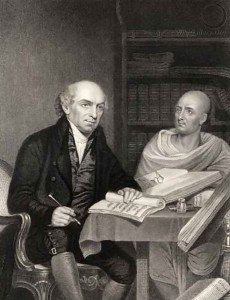 “Those who WANT to think the worst about you will always pass on a false report without checking to see if it’s true first.” Anon
“Those who WANT to think the worst about you will always pass on a false report without checking to see if it’s true first.” Anon
“I have made this letter longer than usual, only because I have not had time to make it shorter.” – Mark Twain
“There is as much providence in the creeping of an aphis upon a rose leaf as in the marching of an army to ravage a continent.” – C. H. Spurgeon
“Remember God has accepted us. The gospel of grace is a message of breathtaking freedom. It must be embraced with faith and thanksgiving. You are thoroughly accepted just as you are. Jesus Christ is your righteousness and he is never going to change. He is the same yesterday, today, and forever. When you wake tomorrow, he will still be your righteousness, before you have done anything to enjoy God’s favour. You have to earn nothing. Your spirit needs to bask in the brilliant sunlight of this reality. You need to know it inwardly and celebrate it on a daily basis.” – Terry Virgo
“If you follow this advice, if you first recognize that you are a child of wrath by nature, guilty of eternal death and damnation, from which no creature, either man or angel, is able to save you, and if you then grasp God’s promise, believing that he has sent Christ, his only Son, to render satisfaction for your sin, to give you his innocence and righteousness, and finally to redeem you from all danger and death, then do not doubt that you belong to the little flock of the elect.” – Martin Luther
“It is most misleading to call this soteriology “Calvinism” at all, for it is not a peculiarity of John Calvin and the divines of Dort, but a part of the revealed truth of God and the catholic (universal) Christian faith. “Calvinism” is one of the “odious names” by which down the centuries prejudice has been raised against it. But the thing itself is just the biblical gospel.” – J.I. Packer
“Reformed theology so far transcends the mere five points of Calvinism that it is an entire worldview.” – R.C. Sproul
“We have now seen the three tactics which the devil employed in his overall strategy to destroy the church. First, he tried through the Jewish authorities to suppress it by force; secondly through the married couple Ananias and Sapphira to corrupt it by hypocrisy; and thirdly through some squabbling widows to distract its leadership from prayer and preaching, and so expose it to error and evil. If he had succeeded in any of these attempts, the new community of Jesus would have been annihilated in its infancy. But the apostles were sufficiently alert to detect ‘the devil’s schemes.’ We need their spiritual discernment today to recognize the activity of both the Holy Spirit and the evil spirit. We also need their faith in the strong name of Jesus by whose authority alone the powers of darkness can be overthrown.” – John R. W. Stott, The Message of Acts (Downers Grove, 1990), page 124.
God’s love has been poured into our hearts through the Holy Spirit who has been given to us. Romans 5:5
“The Comforter gives a sweet and plentiful evidence and persuasion of the love of God to us, such as the soul is taken, delighted, satiated withal. This is his work, and he doth it effectually. To give a poor sinful soul a comfortable persuasion, affecting it throughout, in all its faculties and affections, that God in Jesus Christ loves him, delights in him, is well pleased with him, hath thoughts of tenderness and kindness towards him; to give, I say, a soul an overflowing sense hereof, is an inexpressible mercy.” – John Owen, Works (Edinburgh, 1980), II:240.
“The little birds that sing, sing of God; the beasts clamor for him; the elements dread him, the mountains echo him, the fountains and flowing waters cast their glances at him, and the grass and flowers laugh before him.” – John Calvin, quoted in Timothy George, Theology of the Reformers (Nashville, 1988), pages 192-193.
“No man ever fell into error through being too watchful.” – C.H. Spurgeon
“Spiritual pride takes great notice of opposition and injuries that are received and is apt to be often speaking of them and to be much in taking notice of their aggravations, either with an air of bitterness or contempt. Whereas pure and unmixed Christian humility disposes a person rather to be like his blessed Lord, when reviled, dumb, not opening his mouth, but committing himself in silence to him that judges righteously… It becomes the followers of the Lamb of God, when the world is in an uproar about them and full of clamor against them, not to raise another noise to answer it but to be still and quiet… Meekness and quietness among God’s people, when opposed and reviled, would be the surest way to have God remarkably to appear for their defense… Nothing is so effectual to bring God down from heaven in the defense of his people as their patience and meekness under sufferings.” – Jonathan Edwards, “Thoughts on the Revival,” in Works (Edinburgh, 1979), I:401.
“Men will never worship God with a sincere heart, or be roused to fear and obey Him with sufficient zeal, until they properly understand how much they are indebted to His mercy.” – John Calvin
“Dead fish swim down the stream–living fish swim against it. To swim against the common stream of evil, shows grace to be alive.” – Thomas Watson
“Before He furnishes the abundant supply, we must first be made conscious of our emptiness. Before he gives strength, we must be made to feel our weakness. Slow, painfully slow, are we to learn this lesson; and slower still to own our nothingness and take the place of helplessness before the Mighty One.” – A.W. Pink
“If I profess with the loudest voice and clearest exposition every portion of the truth of God except precisely that little point which the world and the devil are at the moment attacking, I am not confessing Christ, however boldly I may be professing Christ. Where the battle rages, there the loyalty of the soldier is proved to be steady… [It] is mere flight and disgrace if he flinches at that point [of attack].” – Martin Luther
“In commanding us to glorify him, God is inviting us to enjoy him.” – C.S. Lewis
“The elect are gathered into Christ’s flock by a call not immediately at birth, and not all at the same time, but according as it pleases God to dispense his grace to them. But before they are gathered unto that supreme Shepherd, they wander scattered in the wilderness common to all; and they do not differ at all from others except that they are protected by God’s especial mercy from rushing headlong into the final ruin of death. If you look upon them, you will see Adam’s offspring, who savor of the common corruption of the mass. The fact that they are not carried to utter and even desperate impiety is not due to any innate goodness of theirs but because the eye of God watches over their safety and his hand is outstretched to them!” – John Calvin
Continue reading →
 “But when our wickedness had reached its height, punishment and death, was impending over us; and when the time had come which God had before appointed for manifesting His own kindness and power, how the one love of God, through exceeding regard for men, did not regard us with hatred, nor thrust us away, nor remember our iniquity against us, but showed great long-suffering, and bore with us, He Himself took on Him the burden of our iniquities, He gave His own Son as a ransom for us, the holy One for transgressors, the blameless One for the wicked, the righteous One for the unrighteous, the incorruptible One for the corruptible, the immortal One for them that are mortal. For what other thing was capable of covering our sins than His righteousness? By what other one was it possible that we, the wicked and ungodly, could be justified, than by the only Son of God? O sweet exchange! O unsearchable operation! O benefits surpassing all expectation! that the wickedness of many should be hid in a single righteous One, and that the righteousness of One should justify many transgressors!”
“But when our wickedness had reached its height, punishment and death, was impending over us; and when the time had come which God had before appointed for manifesting His own kindness and power, how the one love of God, through exceeding regard for men, did not regard us with hatred, nor thrust us away, nor remember our iniquity against us, but showed great long-suffering, and bore with us, He Himself took on Him the burden of our iniquities, He gave His own Son as a ransom for us, the holy One for transgressors, the blameless One for the wicked, the righteous One for the unrighteous, the incorruptible One for the corruptible, the immortal One for them that are mortal. For what other thing was capable of covering our sins than His righteousness? By what other one was it possible that we, the wicked and ungodly, could be justified, than by the only Son of God? O sweet exchange! O unsearchable operation! O benefits surpassing all expectation! that the wickedness of many should be hid in a single righteous One, and that the righteousness of One should justify many transgressors!”
 “Those who WANT to think the worst about you will always pass on a false report without checking to see if it’s true first.” Anon
“Those who WANT to think the worst about you will always pass on a false report without checking to see if it’s true first.” Anon William Carey (17 August 1761 – 9 June 1834) is known as “the father of modern missions.” A strong Calvinist, he relied on a deep knowledge of God’s Sovereignty, and reached out to a world that was in desperate need of the Gospel of Christ. Carey’s impact on the world was remarkable and today he has at least seven colleges named after him. His most famous quote – “Expect great things from God; attempt great things for God.”
William Carey (17 August 1761 – 9 June 1834) is known as “the father of modern missions.” A strong Calvinist, he relied on a deep knowledge of God’s Sovereignty, and reached out to a world that was in desperate need of the Gospel of Christ. Carey’s impact on the world was remarkable and today he has at least seven colleges named after him. His most famous quote – “Expect great things from God; attempt great things for God.”